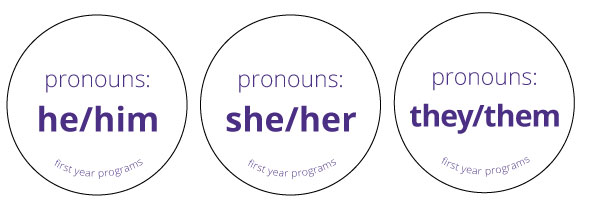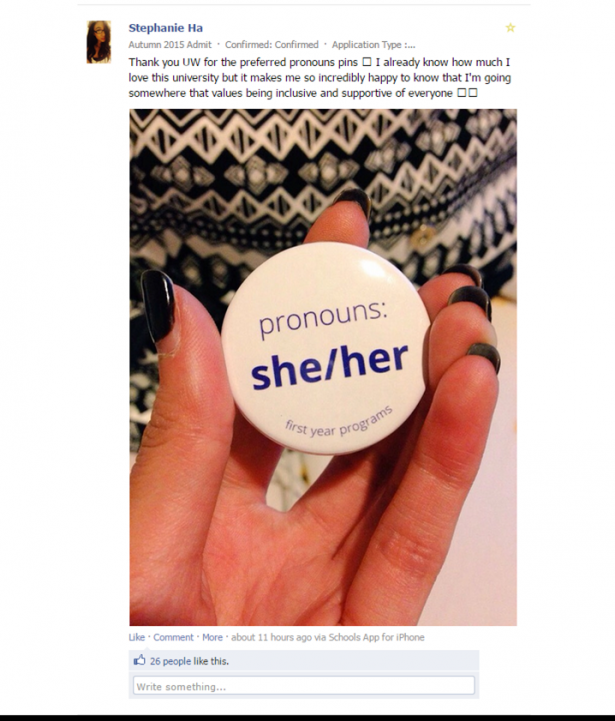Diversity and inclusion are guiding philosophies of First Year Programs. It is important that all students feel welcome at the UW and that their individual identities are recognized and respected. Here are a few ways we aim to create an inclusive community.
Honoring The Land
Traditional protocols guide how we honor the Indigenous peoples whose ancestral lands we inhabit. These protocols originated from historical practices where visiting tribal communities would arrive by canoe to another tribe's homeland. The welcoming ceremony would begin with the host community singing songs from the shore to greet their visitors on the water. The visiting tribe would respond with their own songs before coming ashore. Once landed, a potlatch ceremony would take place where the visitors formally honored and acknowledged their hosts through gift-giving, feasting, and cultural exchange.
One way we do this is through acknowledgment of the land when we begin programs by saying the following:
"The University of Washington acknowledges the Coast Salish people of this land, the land which touches the shared waters of all tribes and bands within the Suquamish, Tulalip, and Muckleshoot nations."
Pronouns
Another way to embrace diversity and inclusion is to use correct pronouns when referring to others. Making an assumption and incorrectly using others’ pronouns can make them feel disrespected or unsafe, especially to members of our community who are trans*.
Trans* (adj.): Anyone whose gender identity and/or gender expression differs significantly from what is expected of them in their culture based on their sex assigned at birth, including people who are transgender, genderqueer, non-binary, and more.
We share our pronouns because we strive to cultivate an inclusive environment where people of all genders feel respected and safe. Being an ally is about behavior, not just intention.
Cisgender (adj.): Non-trans*.
So we invite everyone, including those who are cisgender, to share their pronoun. We recognize that we can't make the assumption about anyone's gender just by looking at them.
Button Designs & Downloads

He/him (pdf)
She/her (pdf)
They/them (pdf)
Hablo Espanol (pdf)
First Generation (png)
Veteran (png)
We are happy to provide buttons to any individual student, faculty, or staff member. Supplies are limited, but feel free to visit First Year Programs in Mary Gates Hall 120 to pick up a button. If you are interested in providing buttons to a group of people, we are happy to share our Adobe Illustrator files so you can place an order. Please email fyp@uw.edu for more information.
What is a pronoun?
Pronouns are words that replace nouns in sentences to make communication more fluid and efficient. The third person singular pronouns in English include 'he,' 'him,' and 'his' (traditionally used for those who self-identify as male), and 'she,' 'her,' and 'hers' (traditionally used for those who self-identify as female). While many languages, including standard English, have historically used only gendered options for third person singular pronouns, modern English usage has evolved to include gender-neutral alternatives such as 'they,' 'them,' and 'theirs' for individuals, along with many other types of pronouns.
He/him/his: can indicate that the subject identifies as male.
-
Andrew is going to be my roommate. He is bringing the mini-fridge.
-
Tyler would like for us to meet him at Odegaard to study for the exam.
-
Todd can’t go to the movie tonight because his partner is sick.
She/her/hers: can indicate that the subject identifies as female.
-
Monica called me to say that she is applying to be on the ASUW Queer Student Commission.
-
Sarah brought her new puppy to campus!
-
I think Brittany left her phone on the table. Do you think this is hers?
They/them/theirs: do not indicate the subject’s gender. Functions as both singular and plural pronouns.
-
Carl is interested in studying abroad. They want to talk to you about what to expect.
-
Kris is going to the Gender Discussion Group meeting with us. We shouldn't leave without them.
-
Jo’s fraternity is recruiting new members. Are you interested in checking out their organization?
Additional pronouns: Ze/hir/hirs, Co/co/cos, and Per/per/pers: do not indicate the subject’s gender.
Someone may also want to be referred to only by their name: Sarah went back to Sarah’s house to take care of the puppy. Jo asked if I liked the members of Jo’s fraternity. I told Jo that they seemed like fun people.
Why share your pronoun?
First Year Programs is committed to creating an inclusive environment for all members of the UW community. We encourage sharing pronouns during introductions and display them on name tags and pronoun buttons to normalize this practice.
When community members ask about our pronoun sharing practices, it creates valuable opportunities for meaningful dialogue. Here are some key reasons why sharing pronouns matters:
- I share my pronouns because I don’t want anyone to feel unsafe or unwelcome and I think this helps.
- I think that sharing my pronouns helps everyone feel included and respected.
- Sharing my pronouns helps make the UW a more welcoming place for people of all genders.
- I want to make sure that everyone gets my name and pronouns right every time; I also want to make sure I get everyone else’s right, too!
- I believe it’s more respectful not to assume someone’s gender based on how I think they look. I’m sharing mine so that you won’t have to assume either!
- I really appreciate that you asked! I share mine because I am an active ally.
- I share mine because I am proud to be trans, and having the chance to share my pronouns at work is phenomenal!
- I share them because I think this helps to create a more positive environment for all people who live, work, visit and learn here at the UW.
Helpful resources
Proper pronoun usage and expectations in the UW community
A guide to gender identity terms — By Laurel Wamsley (June 2, 2021)
5 accidentally transphobic phrases allies use - and what to say instead. — By Katie Dupere (
Trans* ally workbook: Getting pronouns right & what it teaches us about gender. — By Davey Shlasko (August, 2014)
Leaving no trans college student behind. — By Genny Beemyn (October 18, 2015)


